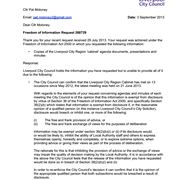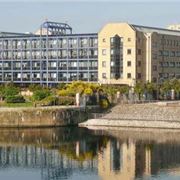WITHIN weeks, Merseysiders will learn whether a new layer of local governance will appear on the political map: the “Combined Authority”.
There will be no elections to this round table which could be handed responsibility for overseeing projects worth millions of pounds in economic development, transport, employment and skills.
'The answer given is so long winded, it
is as though they even want to keep
secret the reasons for their secretiveness'
The elite members of the CA will be the leaders of Sefton, Wirral, Knowsley, St Helens and Halton councils, as well as the elected Mayor of Liverpool, Joe Anderson.
 Wind FarmIt will replace an ad-hoc body that has existed behind the scenes for some years, the Liverpool City Region Cabinet.
Wind FarmIt will replace an ad-hoc body that has existed behind the scenes for some years, the Liverpool City Region Cabinet.
Its members meet in secret, there are no agendas or minutes. Officially it has no formal legal powers or status. It’s more of a kitchen cabinet than a political entity.
So when the all-Labour members get together, what do they talk about? And what impact does their deliberations have on the lives of people in Liverpool and its hinterland?
Opposition Liberal Democrat Chief Whip on Liverpool City Council Pat Moloney wanted to know exactly what went on at the present City Region Cabinet meetings. So he set out to lift the lid on this most clandestine outfit by asking for details - using the much trumpeted Freedom of Information Act.
Cllr Moloney didn’t expect a chapter and verse account of what went on behind closed doors. But the lengthy response he received from the council’s FOI officer took him by surprise.
“I had to read it several times to understand what they were telling me: that the reason for the secretiveness was, in fact, secret," he said.
“If somebody had told me this was a response written by Sir Humphrey in Yes Minister I would have believed it.”
Cllr Moloney went on: “Here we have a group of senior councillors meeting in private to discuss things that affect all of our lives, but we are not entitled to know any details. It’s a strange form of open democracy to me.
“I asked the question because if the new Combined Authority carries on in the same secretive way, it does not auger well for the democratic process, which should embrace openness and transparency.”
"There is already far too much secrecy in local government, and as far as the current City Region Cabinet is concerned we are told we are not even allowed to know what has, or is being discussed, and what if any decisions are taken.
 "The answer given is so long winded, it is as though they even want to keep secret the reasons for their secretiveness."
"The answer given is so long winded, it is as though they even want to keep secret the reasons for their secretiveness."
Back in August, when Liverpool Confidential revealed the Combined Authority plan for the first time, a spokesman from Knowsley, the authority co-ordinating the plan, said: “It will produce agendas and all of the meetings will be held in public, apart from items deemed confidential.”
Cllr Moloney said: "How can we even think of putting forward questions if the secretiveness is so total, we don't know what they talking about?
“In the past few weeks we have seen the way the city council tried to keep details secret of its £25m deal to pay for the conversion of the empty Customs and Excise Building at Queens Dock into apartments.
 Queens Dock Building“That works out at £50 from every man, woman and child in our city, and yet the public has been denied a say.
Queens Dock Building“That works out at £50 from every man, woman and child in our city, and yet the public has been denied a say.
“Even us as properly elected and constituted opposition councillors are finding it harder to extract answers and information from the council. It is making proper scrutiny difficult and at times impossible and that cannot be a good thing in a democracy."
Mayor Joe Anderson, who chairs the Liverpool City Region Cabinet is all for the Combined Authority. He says: “The Government are clear that this is a model of governance that will put regions ahead of the game in the race for funding.
He also described it as "an absolute no-brainer, and merely lays down the existing positive but informal arrangements that already exist. Whatever they might be.
Bring snacks and a flask - that FOI letter in full
|
Enquiries to: Kevin Symm Your Ref: Our Ref: FOI/268729 |
 |
|
Cllr Pat Moloney |
|
|
Email: pat.moloney2@gmail.com |
Date: 3 September 2013 |
Freedom of Information Request 268729
Thank you for your recent request received 29 July 2013. Your request was actioned under the Freedom of Information Act 2000 in which you requested the following information:
-
Copies of the Liverpool City Region 'cabinet' agenda documents, presentations and minutes
Response:
Liverpool City Council holds the information you have requested but is unable to provide all of it due to the following:
-
The City Council can confirm that the Liverpool City Region Cabinet has met on 13 occasions since May 2012, the latest meeting was held on 21 June 2013.
With regards to the elements of your request concerning agendas and minutes of each meeting the City Council is of the opinion that this information is exempt from disclosure by virtue of Section 36 of the Freedom of Information Act 2000, and specifically Section 36(2)(b) which states that information is exempt from disclosure if, in the reasonable opinion of a qualified person (in this instance Liverpool City Council’s City Solicitor), disclosure would breach or inhibit one, or more of the following:
-
The free and frank provision of advice, or
-
The free and frank exchange of views for the purposes of deliberation
Information may be exempt under section 36(2)(b)(i) or (ii) if its disclosure would, or would be likely to, inhibit the ability of Local Authority staff and others to express themselves openly, honestly and completely, or to explore extreme options, when providing advice or giving their views as part of the process of deliberation.
The rationale for this is that inhibiting the provision of advice or the exchange of views may impair the quality of decision making by the Local Authority. It is in accordance with the above the City Council feels that the release of the information you have requested would be done so in breach of Section 36(2)(b)(i) and (ii)
In order to re-enforce the City Council’s decision it can confirm that it is the opinion of the appropriate qualified person that both subsections would be breached a result of disclosure.
For the purposes of clarity the City Council can confirm that, in relation to our response ‘Inhibit’ means to restrain, decrease or suppress the freedom with which opinions or options are expressed. In essence, the City Council feels that if cabinet members, councilors or officers felt that their ideas, suggestions or advice proffered in the earliest stages of discussions would be open to public scrutiny as a result of subsequent requests for information it may affect the honesty with which they express themselves. As a result this may affect the process which is required in order that Local Authorities explore every avenue and option available to them.
Examples of ‘advice’ include recommendations made by more junior staff to more senior staff, professional advice tendered by professionally qualified employees, advice received from external sources, or advice supplied to external sources. However, an exchange of data or purely factual information would not in itself constitute the provision of advice or, for that matter, the exchange of views. It is the opinion of the City Council that the information requested would not fall under the terms of being ‘an exchange of data or purely factual information’
The City Council can confirm that the advice often asked for and provided in such meetings may not be appropriate to disclose. For example, when deliberating budgetary reductions Local Authorities must examine each and every option which may potentially be available to them. The fact that such unpopular options may be discussed could detrimentally affect such discussions if the advice provided were to be disclosed.
The ‘exchange of views’ must be as part of a process of deliberation. Any disclosure of exchanges of views could potentially inhibit the freedom with which such views are discussed.
Finally, ‘deliberation’ refers to the Local Authorities evaluation of competing arguments or considerations in order to make a decision. Again, if deliberation of views and opinion were to be disclosed it could potentially have a negative affect upon the thoroughness with which such deliberations would be discussed.
As Section 36 is a qualified exemption the City Council must conduct a test of public interest when applying such an exemption.
The primary focus when conducting a test of public interest relating to the application of Section 36 must be upon the impact on the relevant Local Authority if the application of the exemption were not upheld. It is with this in mind I can confirm the following:
While the City Council is happy to meet its obligations under the Freedom of Information Act 2000 it must also consider any potential negative or detrimental impact it may be subjected to if it does not appropriately apply the correct exemptions when dealing with requests under the Freedom of Information Act 2000. Accordingly the basis of the public interest test must be upon what is termed as the ‘chilling effect’.
The chilling effect argument is that disclosure of internal discussions would inhibit free and frank discussions in the future, and that the loss of this frankness and openness would damage the quality of advice and deliberation and lead to poorer decision making.
However, to counter this as part of the public interest test public officials are expected to be impartial and robust when giving advice, and not easily deterred from expressing their views by the possibility of future disclosure. It is also possible that the threat of future disclosure could actually lead to better quality advice. Nonetheless, chilling effect arguments cannot be dismissed out of hand.
It is only right that Local Authorities are open to public scrutiny and the City Council recognizes this. However, it would be remiss of the City Council not to acknowledge the importance of tackling difficult issues and making unpopular decisions, which are becoming more and more commonplace. As a result the City Council upholds the decision of the qualified person not to disclose the information requested in this element of your request and, as such, Section 36(2)(b)(i) and (ii) of the Freedom of Information Act 2000 is appropriately applied.
As we have not provided all of the information you have requested, in accordance with the application of Section 36 of the Freedom of Information Act 2000, we are required to serve you with a section 17 notice. Please treat the following as such.
The City Council will consider appeals, referrals or complaints in respect of your Freedom of Information Act 2000 and you must submit these in writing to Informationrequests@liverpool.gov.uk within 28 days of receiving your response.
The matter will be dealt with by an officer who was not previously involved with the response and we will look to provide a response within 28 working days.
If you remain dissatisfied you may also apply to the Information Commissioner for a decision about whether the request for information has been dealt with in accordance with the Freedom of Information Act 2000.
The Information Commissioner’s website is www.ico.gov.uk and the postal address and telephone numbers are:-
Information Commissioner’s Office, Wycliffe House, Water Lane, Wilmslow, Cheshire SK9 5AF. Fax number 01625 524 510, DX 20819, Telephone 01625 545745. Email – mail@ico.gsi.gov.uk (they advise that their email is not secure)
I trust this information satisfies your enquiry
Yours sincerely,
Mr Kevin Symm
Senior Information Officer













